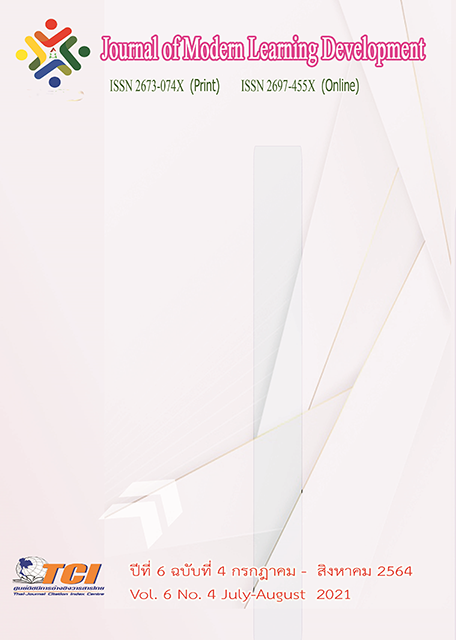An Application of Saraniyadhamma for the Sangha Administration of Photak District, Nongkhai Province
Main Article Content
Abstract
The research entitled “An application of 6 for the Sangha’s Activity Administration of Photak District, Nongkhai Province is the qualitative research in the field study by having the purposes of the research, that Are, 1) to study the principle of 6 as appeared in the Buddhist scripture 2) to study the problems situation of the Sangha’s activity administration of Photak District, Nongkhai Province and 3) to apply the principle of 6 for the Sangha’ activity administration of Photak Distsrict, Nongkhai Province.
The results of the research were fond that the principle of 6 as appeared in the Buddhist Scripture is the state of conciliation that is considered as the power that creates the unity having six items, that is, 1. associated with a loving kindness is the physical action with such as to be charitable for others, not to bully the others. 2. Vacikamma associated with a loving kindness is good, polite, reasonable, words, not to condemn the others 3. Manokamma associated with a loving kindness is the thought with a loving kindness both without blames, to be good thoughts for each other, not to be jealous or not to revenge. If everybody thinks and practices in the same way, the unity will occur in the society. 4. is to know how to share the things for each other in the suitable occasion in order to express the love and good wishes of the people who live in the same society 5. is the affection and unity, to observe the precepts seriously in accordance with one’s own capacity by practicing honestly and the group’s regulation, not to trouble the others and 6. is to have the co-operative opinion, not to be selfish and to respect and listen to the others’ opinions and participate in creating the society to be peace. These six laws of nature, who practices, will create the harmoniousness and to assist each other, not to quarrel, it will cause the unity forever.
From studying each aspect of the Sangha’s activity administration of Photak District, Nongkhai Province, it was found that in the aspect of ruling, the problem is that the Buddhist monks did not give the participation completely in the Sangha’s activity and to behave themselves not to be identical to the Buddha’s teaching and discipline . That is the rightfulness for lifestyle of Sangha who must create the faith for themselves. In the aspect of education, the Buddhist monks play an important roles in teaching and Dhamma study from the first grade to the third grade and Pali study from Pali 1 to 9 by providing the schools for teaching. But there still have the problems, that is, transportation, not enough teachers both in the Dhamma study and Pali study and in the aspect of social assistance, some schools give participation and some do not give. In the moral teaching in school and propagation of Buddhism, majority of Buddhist monks have not enough knowledge in the Buddhist teaching. So the propagation does not face the sufficient successfulness. It is only its fundamental problems. The aspect of public assistance and social assistance occur in the Sangha’s activity administration of Photak District, Nongkhai Province, it still has the problem but a little bit because of the participation between the community and the temples by the community leaders carrying on their duties and the temples are the places for managing activities. That participation is to assist various activities such as to assist the cost of utilities and the cost of repairing the temples and to assist in the crop cremation in order to create the happiness and certainty for the community.
An application of 6 for the Sangha’s activity administration of Photak District, Nongkhai Province is to create the body of knowledge in applying various Buddhist doctrines for propagating Buddhism and to assist the social assistance identity to the six aspects of the Sangha’s activity administration by using the principle of 6 in order to create the unity between people and community in each aspect, that is, 1. The aspect of associated with loving kindness is the physical action with loving kindness such as assistance 2. Vacikamma associated with loving kindness is to have good and polite words 3. Manokamma associated with loving kindness is the concept with loving kindness openly and in private 4. is to share things to each other in accordance with the occasion 5. is harmonious, serious observance of the precepts as appropriate and 6. is a co-operative opinion, not to be selfish.
Article Details
References
พระพรหมคุณาภรณ์ (ป.อ. ปยุตฺโต). (2551). พจนานุกรมพุทธศาสตร์ ฉบับประมวลธรรม. (พิมพ์ครั้งที่ 16). กรุงเทพมหานคร: เอส. ริ้นติ้ง แมสโปรดักส์
สำนักงานพระพุทธศาสนาแห่งชาติ. (2550). คู่มือวิชาการโครงการคนรักษ์วัด. กรุงเทพมหานคร:โรงพิมพ์สำนักงานพระพุทธศาสนาแห่งชาติ
มหาจุฬาลงกรณราชวิทยาลัย. (2539). พระไตรปิฎกภาษาไทย ฉบับมหาจุฬาลงกรณราชวิทยาลัย. กรุงเทพมหานคร: โรงพิมพ์มหาจุฬาลงกรณราชวิทยาลัย
สัมภาษณ พระครูปัญญาธรรมวัตร. ตำแหน่งเจ้าคณะอำเภอโพธิ์ตาก. วัดบ้านกาหม บ้านกาหม ตำบลโพนทอง อำเภอโพธิ์ตาก จังหวัดหนองคาย 43130. สัมภาษณ์วันที่ 12 มีนาคม 2564.
สัมภาษณ์ พระครูจันทธรรมโสภิต. ตำแหน่งรองเจ้าคณะอำเภอโพธิ์ตาก. วัดอรัญญา บ้านโพธิ์ตาก ตำบลโพธิ์ตาก อำเภอโพธิ์ตาก จังหวัดหนองคาย 43130. สัมภาษณ์วันที่ 12 มีนาคม 2564.
สัมภาษณ์ พระครูกันตคุณาจาร. ตำแหน่ง จต.โพนทอง เขต 2. วัดตาหมู บ้านโพนทอง ตำบลโพนทอง อำเภอโพธิ์ตาก จังหวัดหนองคาย 43130. สัมภาษณ์วันที่ 12 มีนาคม 2564.
สัมภาษณพระครูโพธิธรรมานุสิฐ. ตำแหน่ง จต.โพธิ์ตาก. วัดศรีสังวร บ้านนาฝาก ตำบลโพนทอง อำเภอโพธิ์ตาก จังหวัดหนองคาย 43130. สัมภาษณ์วันที่ 12 มีนาคม 2564.


